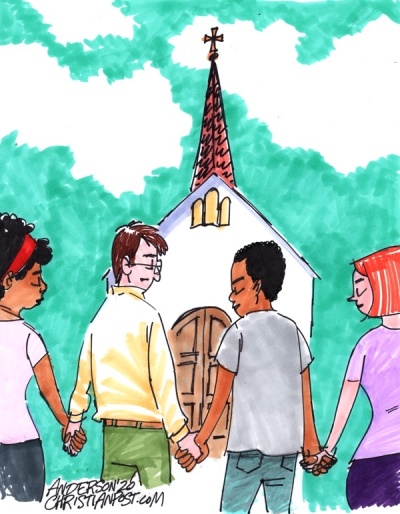Jemar Tisby and critical race theory

Did you know that having disagreements with others who don’t share your point of view isn’t always a bad thing or has to end with both parties hating one another?
I may strongly disagree with people advancing a form of anti-racism in the church, but that doesn’t mean we’re mortal enemies.
That said, I felt it necessary to write a thoughtful and respectful response to a few questionable beliefs that my brother in the Lord, Jemar Tisby, a prominent Evangelical voice for racial reconciliation, holds regarding racism, equality and justice.
I start by pointing out that I appreciate Tisby’s passion to see God’s church unite under the banner of reconciliation. Some points presented in his book, How to Fight Racism: Courageous Christianity and the Journey Toward Racial Justice, were insightful and beneficial to me personally. In the book, Tisby talks about the need for more awareness, improvement in our relationships, and an undying commitment to “dismantle racist structures, laws and policies” if we hope to bring forth significant change and end racism.
Yet, as I dug further into Tisby’s writings and listened to his teachings online, I came across four red flags you should be made aware of regarding Tisby’s work on advancing racial justice:
Red flag #1: Aligning with anti-Christian thought
On multiple occasions, Tisby references and quotes from Robin DeAngelo, Ibram X. Kendi, and Eddo Lodge. All three of these writers are anti-Christian. In White Fragility, Dr. DiAngelo pushes the narrative that white people are inherently racist. The premise of Ibram X. Kendi’s book, How to Be an Antiracist, is that racism is the default of the world. You are either racist or anti-racist. There is no in-between.
Although Tisby defends a biblical view of the Imago Dei, he, nonetheless, embraces this mischaracterization of the human identity espoused by anti-Christian thinkers.
It’s one thing to say racism is a moral evil and should never be tolerated. It’s quite another to brand people as racist or anti-racist.
This sort of labeling of people is a red flag because the Bible doesn’t artificially superimpose “oppressed” or “oppressor” as the universal identity of a person.
It inevitably leads to more discrimination. The very thing Tisby and his anti-Christian references say they oppose.
Red flag #2: Mistreating biblical text to advance a racial ideology
In an interview with Christianity Today, Tisby stated, “We would first need to understand that all theological interpretation is contextual, that we all bring specific priorities to the text based on our own histories and social location. In this sense, there’s no such thing as ‘pure biblical interpretation.’ All our interpretation is shaped by our histories. This isn’t to say there are no timeless truths or universal principles, but it is to say that even the questions we ask are going to vary across people groups and across time periods.”
Tisby is partially correct.
However, the red flag here is that Tisby overlooks the most basic standards of hermeneutics.
Proper hermeneutics has nothing to do with a personal perspective. Our “priorities,” “histories,” or “experiences,” or even the color of our skin are never to be the catalyst or driving force to interpreting the Bible.
The proper standard of hermeneutics is to preserve the original intent of the author (as intended) and respect the conditions that produced the message (the text) to its designated recipients (the context).
Regrettably, I came across several teachings of Tisby online where it seemed common practice for him to decontextualize the Bible.
Allow me to present you with an example.
In a sermon taught by Tisby, he takes the prophetic passage of Jesus in Luke 4:18 (along with Genesis 3:15) and superimposes a “black experience” of oppression to the text.
The text reads, “The Spirit of the Lord is on me, because he has anointed me to proclaim good news to the poor. He has sent me to proclaim freedom for the prisoners and recovery of sight for the blind, to set the oppressed free” (Luke 4:18).
If you read further in Luke 4:31-44, the primary oppression being described is more of a spiritual kind than anything else. However, to get the passage to comply with black liberation theology, Tisby interposes his personal views into the text. By doing this, Tisby undermines the prophetic word of Isaiah, stifles the Messianic fulfillment, and reduces Jesus’s public declaration to set people free from their sins.
Red flag #3: Defending critical race theory (CRT)
In 2021, Tisby came out hard after the Lenses Institute (ministry of Cru) brought up concerns about CRT being taught in conjunction with their efforts to bring about racial reconciliation. Tisby called it “fear-mongering” over CRT and “resistance to racial justice.”
Therein lies the red flag.
To say Christians who oppose CRT are a “resistance” to racial justice is a harsh judgment and reveals Tisby’s prejudice towards white people or anyone (no matter their religion or nationality) who doesn’t see eye-to-eye with him on CRT.
In another article, Tisby falsely assumes that the war on CRT has its roots in conservative white churches. There certainly are voices from the conservative base, mostly white Christians. However, the primary defenses made against the ideology of CRT have nothing to do with a person’s skin color. It has to do with the ideological framework of CRT that directly contradicts the Bible and violates another person’s religious views and theology.
Not all Christians who oppose CRT are making a concerted effort to undermine biblical unity among different ethnic groups. I am one of them.
Red flag #4: Misconstruing racial injustices
There are many faulty and sometimes vague assumptions in the book. For example, a centerpiece of Tisby’s How to Fight Racism is “racial justice.” On pages 5 and 6, Tisby writes, “To enact society-wide change, people must commit to deconstructing laws that have a disparate impact on people of different races and rewrite the rules so they lead to greater equity among people of all races and ethnicities.” If you notice, Tisby’s definition is never well-defined and lacks a path of biblical justice and restoration.
My friend, Neil Shenvi, posted a blog on his website entitled “A House Divided: A Review of Tisby’s How to Fight Racism.” In his blog, Neil presents two primary concerns. First, Tisby tends to conflate racial disparities with racial injustice. And the second concern has to do with Tisby’s use of equity over equality.
Neil writes, “Tisby’s distinction between 'equality' and 'equity,' which is common in anti-racist circles, explicitly and intentionally challenges colorblind approaches to 'racial justice.' Of course, this distinction is sometimes reasonable: no one thinks that it is 'unfair' to build wheelchair ramps on the grounds that we are giving 'special treatment' to disabled individuals. On the other hand, many people are understandably uncomfortable with the idea that race alone entails that a particular individual needs differential treatment to offset the disadvantages they face. To give special consideration to a wealthy black student whose parents are both doctors on the grounds that he is somehow disadvantaged seems both unrealistic and condescending.”
In other words, in Tisby’s mind, anything that perpetuates inequities is the result of racism, which would mean that any wealth achieved is because of discrimination. By the same token, any poverty experienced by a person of color is because of discrimination. Therefore, to level the playing field, it is necessary to “steal” from those who have more so that minorities can have their “fair share.”
I believe you see the red flag to this kind of thinking.
At the end of the day, I respect Tisby as a Christian leader and pray, together, we can stand united in our love for the gospel and for one another — even with our staunch disagreements.
Jason Jimenez is president of STAND STRONG Ministries, a faculty member at Summit Ministries, and the author of Challenging Conversations: A Practical Guide to Discuss Controversial Topics in the Church. For more info, check out www.standstrongministries.org.



























